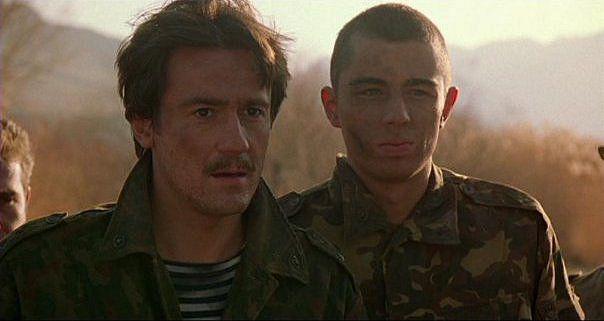In chapter one of The Day Last More than a Hundred Years, Yedigei describes his life working out on the steppe as railway operator. He describes how living out on the steppe is a different way of life that takes patience and hard work, and how younger Russians “would not put up with it”. Continue reading
Russia
Prisoner of the Mountains
The film “Prisoner of the Mountains” shows a side of war completely foreign to Americans in some aspects. First being the close proximity that a war is being fought to their homes, and second the treatment of Prisoners of War (POW’s). Continue reading
Pick One: Human Life or Retaliation
“Prisoner of the Mountains,” the movie this week, was extremely thought provoking. I especially found the relationship between the two Russian soldiers to be very interesting. The juxtaposition of Vanya, the young naive solider, and Sasha, the rather cynical officer, added a layer to this war movie that isn’t usually seen, in my opinion. While Vanya took an interest in local culture, and developed a bond with their captor Abdul’s teenage daughter, Sasha was mainly focused on escape, and contextualizing their imprisonment by stating numerous times, “It’s war.”
As the film progresses, Vanya is revealed as not having the “typical” solider persona. He is soft-hearted, peaceful, and unable to kill. Instead he excels at working with his hands, building a mechanical bird out of sticks for the daughter and fixing Abdul’s watch. These are skills of little use to a soldier, especially during wartime. During the ambush, as Sasha leads the fight against the Chechens, Vanya cowers and shuts his ears to the gunfire. While on the surface he may seem to fit the identity, his personality contradicts the expectations of a Russian soldier.
The pair has an unfriendly relationship at first, with Sasha bullying and dismissing Vanya. In one scene, Sasha expresses his desire to come back some day and kill all the Chechens, but Vanya does not want to kill any of them. In response, Sasha says, “Vanya, we have to. This is war.”
Sasha softens up to Vanya, becoming more of a parental figure throughout the movie, and eventually dies taking the blame for Vanya’s mistake. The first time Sasha is seen as vulnerable is when he has a breakdown, shedding numerous tears while trying to hold himself together. This greatly contrasts with the opening scene in which he is laughing as he fires a gun. This lends a strange twist to Sasha’s character, whose identity is seen as the most stable, concrete representative of a soldier.

The closing scene of the movie is also another powerful moment in the movie: Russian helicopters fly over Vanya to bombard the villages, instead of actually saving their soldier, which happens after Abdul chooses not to kill Vanya. This left me in a rather conflicted state of mind. Does this mean retaliation is greater than the value of human life? Is this supposed to form a civilized image of the Chechens while exposing the barbarism of the Russians? Or is this simply war in its purest form?
This movie certainly addresses our tendencies to resort to hatred and violence when confronted with the “other,” instead of realizing how much more in common we have with each other. It takes on the challenge of portraying the commonality of the human experience, but also not leaving out the differences, which I think is important. I enjoyed how it exposed a deeper relationship between Russia and Chechnya, and left the viewer debating some rather complicated questions about war.
Dachas. A Communist Success
While many aspects of life in the Cold War are remembered on both sides (bomb shelters, fear, rationing, drafts, etc.) dachas are little known in the United States. These small, communal, farm-cottages located on the outskirts of the city provide one of the clearest differences between the two superpowers’ domestic life. Continue reading
The Krusty View of Russian Cartoons
In class, during the discussion on Russian cartoons, a clip of the Simpsons was shown. During the clip, “Krusty the Clown” aired a Eastern European version of “Itchy and Scratchy,” and the satirical product depicted helped illustrate the american perception of the USSR. Continue reading
Winnie the Pooh: Russia vs. Disney
The Russian version of Winnie the Pooh isn’t very different from the Disney version of Winnie the Pooh. The most of the differences are in the different nature of the stories and details. Continue reading
Importance of Dacha’s
The importance of Dacha’s to Russians cannot be overstated. These little plots of farming land offered Russians an escape from regular life. Being able to travel outside the city and escape from normal life is something that can often be overlooked. Continue reading
Comrade, use the Anti-Tank Rifles!
Tanks helped define much of World War II and its many battle, particularly along the eastern front. Since it was not always possible for tanks to be met with tanks, anti-tank weapons were developed and used by all participants. The instructions to the Russian troops on the use of Anti-Tank Rifles (ATR) were comprehensive but at times contradictory.
The Russians Did it Too
People always forget about the human rights atrocities committed during World War Two by everyone other than the Germans. The Russians were by no means free of this, they forced the removal of hundreds of thousands of people during the wartime. Continue reading
Indigenization or Europeanization
The Soviet policy of Korenizatsiia (indigenization) is remarkably European in nature, and reflects many of the influences and Western thinking often used during the expansion of Socialist and Nationalist ideals in the post-Russian Civil War era. Continue reading